Every PM advice article preaches the same meeting prep gospel:
- Create structured agendas
- Define clear outcomes
- Prepare talking points
- Document decisions
Meanwhile, 95% of PMs are clicking "Join meeting" with 30 seconds to spare
1/12
- Create structured agendas
- Define clear outcomes
- Prepare talking points
- Document decisions
Meanwhile, 95% of PMs are clicking "Join meeting" with 30 seconds to spare
1/12
There was a Reddit thread asking about meeting prep tools revealed everything
Top answer with 14 upvotes: "Brain, mostly. Pen, when necessary. The most important tool though is the toilet."
Another senior PM: "My mouse to click Join meeting. Anything beyond that I don't have the ROI to bother"
We're all living this lie
2/12
Top answer with 14 upvotes: "Brain, mostly. Pen, when necessary. The most important tool though is the toilet."
Another senior PM: "My mouse to click Join meeting. Anything beyond that I don't have the ROI to bother"
We're all living this lie
2/12
The meeting prep theater goes like this:
Monday: Create elaborate Notion template for meeting preparation
Tuesday: Fill it out once, feel productive
Wednesday: Skip it, meeting goes fine
Thursday: Abandon template
Friday: Back to sticky notes
Every. Single. Time.
3/12
Monday: Create elaborate Notion template for meeting preparation
Tuesday: Fill it out once, feel productive
Wednesday: Skip it, meeting goes fine
Thursday: Abandon template
Friday: Back to sticky notes
Every. Single. Time.
3/12
What actually happens before meetings:
3 minutes before: Quick Slack to ask "what are we discussing again?"
2 minutes: Scan last email thread for context
1 minute: Open relevant doc
30 seconds: Test audio
0 seconds: Turn on camera, act prepared
And the meeting usually goes fine
4/12
3 minutes before: Quick Slack to ask "what are we discussing again?"
2 minutes: Scan last email thread for context
1 minute: Open relevant doc
30 seconds: Test audio
0 seconds: Turn on camera, act prepared
And the meeting usually goes fine
4/12
The psychology behind meeting prep frameworks is fascinating
We create complexity to feel professional
We document things nobody will read
We prepare for scenarios that won't happen
We template conversations that need to be organic
All because admitting we wing it feels unprofessional
5/12
We create complexity to feel professional
We document things nobody will read
We prepare for scenarios that won't happen
We template conversations that need to be organic
All because admitting we wing it feels unprofessional
5/12
I've sat through hundreds of "well-prepared" meetings
The ones with 10-slide pre-reads nobody read
The ones with elaborate RACI matrices
The ones with minute-by-minute agendas
They weren't more productive than the ones where we just... talked
6/12
The ones with 10-slide pre-reads nobody read
The ones with elaborate RACI matrices
The ones with minute-by-minute agendas
They weren't more productive than the ones where we just... talked
6/12
Your stakeholders aren't studying your agenda
They're also joining with 30 seconds to spare
They haven't read your pre-read
They forgot what this meeting is about
They're hoping you'll remind them why we're here
The whole thing is collaborative improvisation
7/12
They're also joining with 30 seconds to spare
They haven't read your pre-read
They forgot what this meeting is about
They're hoping you'll remind them why we're here
The whole thing is collaborative improvisation
7/12
The framework that senior PM shared on Reddit is actually brilliant:
Just track:
- What we're discussing (one line)
- Who owns it
- What outcome we need
That's it. Everything else is performance anxiety disguised as preparation.
8/12
Just track:
- What we're discussing (one line)
- Who owns it
- What outcome we need
That's it. Everything else is performance anxiety disguised as preparation.
8/12
Most meeting prep "tools" solve the wrong problem
They optimize for documentation, not conversation
They add friction to human connection
They create artifacts nobody references
They make simple things complicated
When what we really need is clarity of intent
9/12
They optimize for documentation, not conversation
They add friction to human connection
They create artifacts nobody references
They make simple things complicated
When what we really need is clarity of intent
9/12
Here's what works:
Know your one key outcome
Have your one burning question
Bring your one important context
Everything else emerges from genuine conversation
The best meetings aren't scripted, they're responsive
10/12
Know your one key outcome
Have your one burning question
Bring your one important context
Everything else emerges from genuine conversation
The best meetings aren't scripted, they're responsive
10/12
This is why product managers burn out on process
We're told to prepare perfectly for everything
Document thoroughly
Plan meticulously
Structure completely
When 80% of our value comes from showing up and using our judgment in the moment
11/12
We're told to prepare perfectly for everything
Document thoroughly
Plan meticulously
Structure completely
When 80% of our value comes from showing up and using our judgment in the moment
11/12
If you're exhausted by meeting prep expectations, I built something different
AI prompts that skip the theater and get to the point:
- Quick context gathering (30 seconds)
- Key questions to ask (not scripted)
- Outcome clarity (one sentence)
Grab here:
12/12prodmgmt.world/products/ai-pr…
AI prompts that skip the theater and get to the point:
- Quick context gathering (30 seconds)
- Key questions to ask (not scripted)
- Outcome clarity (one sentence)
Grab here:
12/12prodmgmt.world/products/ai-pr…
• • •
Missing some Tweet in this thread? You can try to
force a refresh





